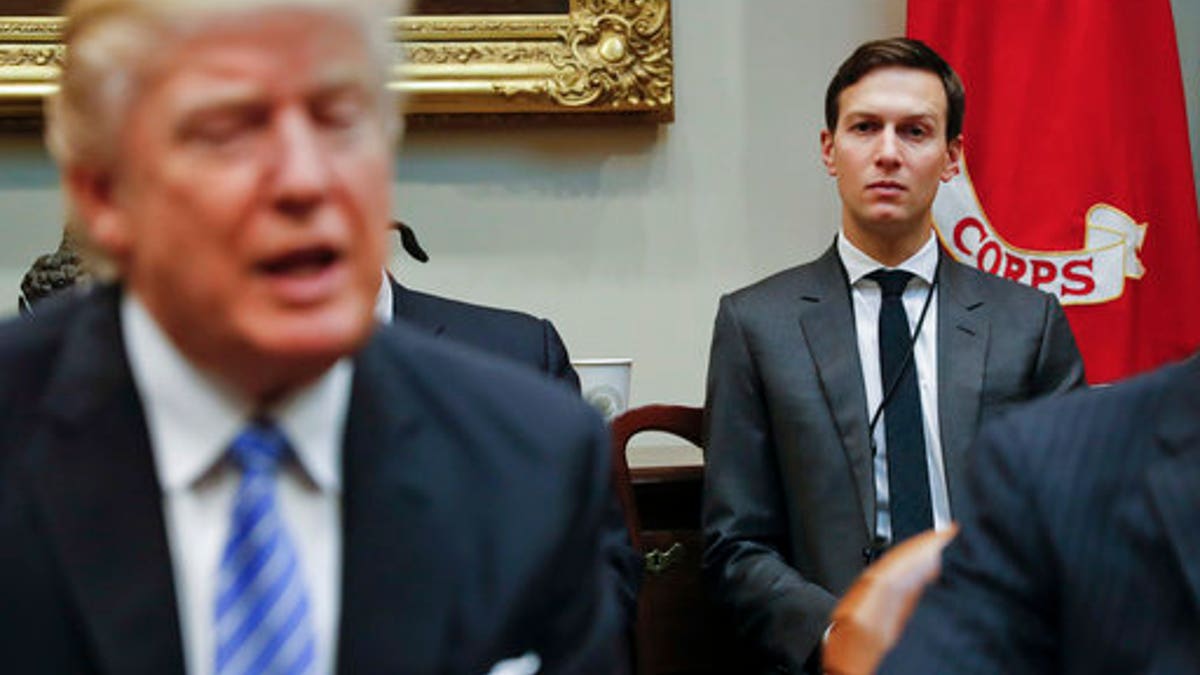
Jared Kushner, the son-in-law of President Donald Trump and top White House adviser, was seeking a private communications channel with the Kremlin, a new report says. (AP)
Jared Kushner, President Donald Trump’s son-in-law and one of the senior advisers in the Trump administration, was seeking a private communications channel with the Kremlin, according to a new report in The Washington Post.
Kushner and Sergei Kislyak, the Russian ambassador to Washington, spoke of the possibility of coordinating a secret and secure communications channel between the Trump transition team and the Kremlin, U.S. officials briefed on intelligence reports told The Post.
At the same time, a new Reuters report stated that Kushner had at least three previously undisclosed contacts with Kislyak during and after the 2016 presidential campaign. Those contacts included two phone calls between April and November 2016. Seven current and former U.S. officials confirmed the information with Reuters.
Jamie Gorelick, Kushner’s attorney, told Reuters that her client couldn’t recall any phone conversations with Kislyak between April and November of last year.
"Mr Kushner participated in thousands of calls in this time period. He has no recollection of the calls as described. We have asked (Reuters) for the dates of such alleged calls so we may look into it and respond, but we have not received such information," Gorelick said.
The Post said Kushner suggested the use of Russian diplomatic facilities as a way to shield pre-inauguration discussions with Kislyak from monitoring. Kislyak allegedly then relayed the suggestion to his superiors in Moscow. The idea was supposedly broached during a meeting between Kushner and Kislyak during an early December meeting at Trump Tower.
That was based on intercepts of Russian communications that were reviewed by U.S. officials, although neither the meeting nor the communications of the Americans involved were under U.S. surveillance, officials told the Post.
Michael Flynn, President Trump’s former National Security Adviser, also attended the meeting.
The meeting was initially disclosed in March by the White House. But the FBI now considers the meeting, in addition to another one Kushner had with a Russian banker, to be of investigative interest, people familiar with the matter told the Post.
STEVE BANNON TO HEAD TRUMP'S RUSSIA WAR ROOM OF LEGAL 'A-TEAM,' STREET FIGHTERS AND SURROGATES
The White House declined to comment on the report, as did Robert Kelner, a lawyer for Flynn.
The Russian embassy did not reply to requests for comment.
Kislyak was allegedly surprised by the suggestion of permitting an American to use Russian communications equipment at its consulate or embassy as the proposal could have had innate security risks both for the Trump team and for Moscow.
Communications of Russian officials in the U.S. are closely monitored by the FBI, which keeps ongoing surveillance of its diplomatic facilities. The National Security Agency, meanwhile, monitors Russian officials communications overseas.
News of the contents of the reported discussions comes amid recent reports that Kushner is under FBI scrutiny as part of the investigation into possible collusion between the Trump campaign and Russia.
Russia is known for inserting false information into communication streams it thinks may be monitored as part of an effort to spread confusion amidst U.S. analysts.
JARED KUSHNER: TRUMP SON-IN-LAW'S LINK TO RUSSIA INVESTIGATION AND WHITE HOUSE INFLUENCE
News of the meeting first came to The Post via an anonymous letter in December. The letter noted Kushner’s suggestion of the communication channel with Kislyak. Anonymous officials who reviewed the letter have since told The Post that the section mentioning the secret channel was consistent with their understanding of events.
Kushner allegedly told the Russians that he was aware of the political sensitivity to meeting publicly but that it was still necessary to communicate with Russian government officials. In addition to talk of coordinating the communications channel, Kislyak, Kushner and Flynn also discussed arranging a meeting between a Trump representative and a “Russian contact” in a third country, the paper reported.
That contact was not identified, according to the anonymous letter cited by The Post.




















